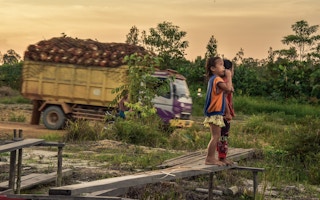A survey of major palm oil buyers on their pledges to help curb deforestation shows that a quarter, mostly based in Asia, have yet to make commitments to purchase sustainable supplies, green group WWF said on Friday.
The scorecard, now running for a decade, looked at 173 big buyers of the vegetable oil, including retailers, consumer goods firms and food companies, in the United States, Canada, Europe, Australia, Singapore, Indonesia and Malaysia.
Each company was assessed according to their pledges to source sustainable palm oil and deforestation polices in their supply chains, among other things.
Italian confectioner Ferrero, maker of chocolate spread Nutella, came out top, while Asian brands - included for the first time - lagged behind, with many declining to take part.
“The best companies out there are doing a lot more besides just buying certified sustainable oil,” said Elizabeth Clarke, palm oil lead at WWF in Singapore.
“And yet even then, there are still a quarter of companies who aren’t even making a commitment of the most basic kind. It’s disturbing that the laggards are falling further behind,” she told the Thomson Reuters Foundation.
Palm oil is the world’s most widely used edible oil, found in everything from margarine to soap, but it has faced scrutiny from green activists and consumers, who have blamed its production for forest loss, fires and worker exploitation.
Pressure on companies to buy sustainable palm oil - from investors, governments, consumers and green groups - has fallen behind in Asia compared with other regions like Europe, the United States and Australia in the last decade, Clarke said.
“It’s time that changed because over half of the world’s palm oil is consumed in Asia,” she said.
The purpose of including Asian companies in the survey this time was to highlight the issue, she added.
“
There are still a quarter of companies who aren’t even making a commitment of the most basic kind. It’s disturbing that the laggards are falling further behind.
Elizabeth Clarke, global palm oil lead, WWF Singapore
‘Broken promises’
Many global household brands that buy and use palm oil agreed in 2010 to ensure their supplies did not contribute to deforestation within a decade, but many are struggling to meet their pledges.
Out of those contacted for the survey, only 132 companies engaged with WWF. The results showed 117 had made public commitments to source only palm oil certified as sustainable by 2020 - and just 78 had met that goal.
The last decade had been one of “broken promises”, said Clarke. “If companies aren’t transparent or making formal, public commitments to sustainability then there is no accountability,” she added.
The WWF palm oil scorecard, now in its fifth edition with the last published in 2016, also asked companies about what actions they had taken to protect and support smallholders, communities and biodiversity on the ground.
It found a quarter were investing in such initiatives in areas at risk of unsustainable palm oil development.
In Malaysia, the second-biggest palm oil producer behind Indonesia, most companies declined to participate in the survey.
“Malaysian companies can be drivers of change … but they need to step up,” said Benjamin Loh, sustainable palm oil manager for WWF-Malaysia.
This story was published with permission from Thomson Reuters Foundation, the charitable arm of Thomson Reuters, that covers humanitarian news, climate change, resilience, women’s rights, trafficking and property rights. Visit http://news.trust.org/climate.

















